|
Books Should Be Free Loyal Books Free Public Domain Audiobooks & eBook Downloads |
|
|
Books Should Be Free Loyal Books Free Public Domain Audiobooks & eBook Downloads |
|
Top Authors |
|---|
|
Book type:
Sort by:
|
By: Booth Tarkington | |
|---|---|
 The Magnificent Ambersons
The Magnificent Ambersons
The Magnificent Ambersons is a 1918 novel by Booth Tarkington which won the 1919 Pulitzer Prize. It was the second novel in the Growth trilogy, which included The Turmoil (1915) and The Midlander (1923, retitled National Avenue in 1927). In 1942 Orson Welles directed a film version, also titled The Magnificent Ambersons. | |
 Penrod and Sam
Penrod and Sam
Follow more of the hilarious life of the boy Penrod Schofield, his friends Sam Williams, Herman, Verman, Georgie, Maurice, and the love of his life, Marjorie Jones. | |
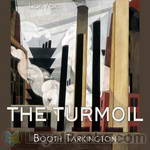 The Turmoil
The Turmoil
The Turmoil is the first novel in the ‘Growth’ trilogy, which also includes The Magnificent Ambersons (1918) and The Midlander (1923, retitled National Avenue in 1927). In 1942 Orson Welles directed a film version based on volume 2, also titled “The Magnificent Ambersons.” The trilogy traces the growth of the United States through the declining fortunes of three generations of the aristocratic Amberson family in a fictional Mid-Western town, between the end of the Civil War and the early part of the 20th century, a period of rapid industrialization and socio-economic change in America... | |
By: Gideon Wurdz (b. 1875) | |
|---|---|
 The Foolish Dictionary
The Foolish Dictionary
“The Foolish Dictionary” was written by “Gideon Wurdz” and was published in 1904. According to the beginning of the book, it is “An exhausting work of reference to un-certain English words, their origin, meaning, legitimate and illegitimate use…” This a a short but amusing dictionary which “redefines” words in some interesting ways. Funny and sometimes bizarre observations are sprinkled throughout. In keeping with the policy to read, rather than attempt to rewrite, books – even those with offensive content – nothing has been omitted... | |
By: William Shuler Harris (b. 1865) | |
|---|---|
 Life in a Thousand Worlds
Life in a Thousand Worlds
A jolly romp, which could be perhaps be described as Gulliver’s Travels Through Our Solar System and Beyond, as written by a great admirer of C. S. Lewis, on a rainy Sunday afternoon, after one too many mugs of cocoa. Includes some thought on alien philosophies and how to apply them to moral and social problems here on Planet Earth. | |
By: Heinrich Hoffmann (1809-1894) | |
|---|---|
 Struwwelpeter: Merry Tales and Funny Pictures
Struwwelpeter: Merry Tales and Funny Pictures
Struwwelpeter (Slovenly Peter) is an illustrated collection of humorous children’s poems describing ludicrous and usually violent punishments for naughty behavior. Hoffmann, a Frankfurt physician, wanted to buy a picture book for his son for Christmas in 1844. Not impressed by what the stores had to offer, he instead bought a notebook and wrote his own stories and pictures. While Struwwelpeter is somewhat notorious for its perceived brutal treatment of the erring children, it has been influential on many later children’s books, most notably Charlie and the Chocolate Factory. | |
 Slovenly Betsy
Slovenly Betsy
Hienrich Hoffmann was a German psychiatrist and doctor. He had written poetry and sketches for his son, and was persuaded to have a collection of these printed.The stories were not perceived as cruel or overly moral by Hoffmann's contemporaries.This American version contains a few of the stories from the original German "Struwwelpeter" publication. | |
By: Theodore Roosevelt | |
|---|---|
 Theodore Roosevelt: An Autobiography
Theodore Roosevelt: An Autobiography
In his vital, illustrative and dynamic autobiography, Theodore Roosevelt let us into the life that formed one of the greatest and outspoken presidents in American history. Not only are we privy to the formation of his political ideals, but also to his love of the frontier and the great outdoors. | |
 Through the Brazilian Wilderness
Through the Brazilian Wilderness
Roosevelt’s popular book Through the Brazilian Wilderness describes his expedition into the Brazilian jungle in 1913 as a member of the Roosevelt-Rondon Scientific Expedition co-named after its leader, Brazilian explorer Cândido Rondon. The book describes all of the scientific discovery, scenic tropical vistas and exotic flora, fauna and wild life experienced on the expedition. One goal of the expedition was to find the headwaters of the Rio da Duvida, the River of Doubt, and trace it north to the Madeira and thence to the Amazon River... | |
 Letters to His Children
Letters to His Children
The strong, vigorous, exalted character of a doting father who loved playing with his children and their pets, even while serving as the President of the United States, stands revealed in this selection of letters he wrote his children throughout their school years. They shed light on the cheerful man who remained throughout his life as pure and gentle as the soul of a child, plus many little reveals that there were squirrels nesting in the presidential bedroom, rats in the basement, and children's... | |
By: Francois Guizot (1787-1874) | |
|---|---|
 Popular History of France from the Earliest Times
Popular History of France from the Earliest Times
François Pierre Guillaume Guizot (1787-1874) was a French historian, orator, and statesman. Guizot was a dominant figure in French politics prior to the Revolution of 1848, actively opposing as a liberal the reactionary King Charles X before his overthrow in the July Revolution of 1830, then in government service to the “citizen king” Louis Philippe, as the Minister of Education, 1832-1837, ambassador to London, Foreign Minister 1840-1847, and finally Prime Minister of France from September 19, 1847 to February 23, 1848. His “Popular History of France” is an attractive and engrossing narravative, here presented in an easily readable English translation. | |
By: Alphonse Daudet (1840-1897) | |
|---|---|
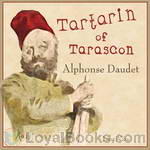 Tartarin of Tarascon
Tartarin of Tarascon
It tells the burlesque adventures of Tartarin, a local hero of Tarascon, a small town in southern France, whose invented adventures and reputation as a swashbuckler finally force him to travel to a very prosaic Algiers in search of lions. Instead of finding a romantic, mysterious Oriental fantasy land, he finds a sordid world suspended between Europe and the Middle East. And worst of all, there are no lions left. | |
By: George Bernard Shaw (1856-1950) | |
|---|---|
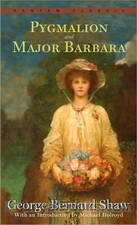 Pygmalion
Pygmalion
If you've watched and loved the delightful musical My Fair Lady, then you'd love to read the wonderful play on which it is based. Pygmalion by George Bernard Shaw is equally engrossing and as full of charm, wit and underlying pathos. First performed on stage in 1912, Pygmalion takes its title from the Greek myth of Pygmalion and Galatea. In the ancient story, a brilliant sculptor, Pygmalion falls in love with one of his own creations, a ravishingly beautiful sculpture whom he names Galatea. He propitiates Aphrodite, who grants his wish that his statue would come to life and that he could marry her... | |
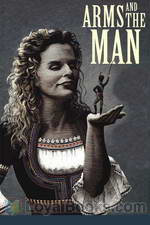 Arms and the Man
Arms and the Man
Arms and the Man is a comedy by George Bernard Shaw that takes place in 1885, during the Serbo-Bulgarian War. Raina Petkoff is engaged to the gallant Sergius Saranoff, hero of the recent Bulgarian victory over the Serbs. But she is distracted by the abrupt arrival of Captain Bluntschli, a Swiss mercenary who fought for the Serbian army. He takes refuge in her bedroom after the battle and although he is initially threatening, reveals that he carries chocolates instead of bullets. Will Raina marry the posturing Sergius or the chocolate cream soldier? Extra intrigue is provided by saucy servant girl Louka, her dour fiance Nicola, and Raina's hand-wringing parents. | |
 The Admirable Bashville
The Admirable Bashville
The Admirable Bashville is a product of the British law of copyright. As that law stands at present, the first person who patches up a stage version of a novel, however worthless and absurd that version may be, and has it read by himself and a few confederates to another confederate who has paid for admission in a hall licensed for theatrical performances, secures the stage rights of that novel, even as against the author himself; and the author must buy him out before he can touch his own work for the purposes of the stage... | |
 Mrs. Warren's Profession
Mrs. Warren's Profession
The story centers on the relationship between Mrs Kitty Warren, a rich woman, described by the author as "on the whole, a genial and fairly presentable old blackguard of a woman" and her daughter, Vivie. Mrs Warren is a middle-aged woman whose Cambridge-educated daughter, Vivie, is horrified to discover the morally questionable way her mother acquired her fortune. | |
 The Doctor's Dilemma
The Doctor's Dilemma
The Doctor's Dilemma is about Dr. Colenso Ridgeon, who has recently been knighted because of a miraculous new treatment he developed for tuberculosis. As his friends arrive to congratulate him on his success, he is visited by two figures who present him with a difficult decision. He has room for one more patient in his clinic; should he give it to Louis Dubedat, a brilliant but absolutely immoral artist, or Dr. Blenkinsop, a poor and rather ordinary physician who is a truly good person? Dr. Ridgeon's dilemma is heightened when he falls for Jennifer Dubedat, the artist's wife, who is innocent of her husband's profligacy. | |
By: Katherine Mansfield (1888-1923) | |
|---|---|
 The Garden Party
The Garden Party
A collection of short stories on a variety of subjects, by one of New Zealand’s best-known writers. | |
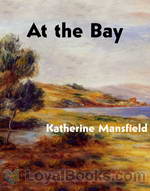 At The Bay
At The Bay
Katherine Mansfield was a prominent Modernist writer of short fiction, and one of New Zealand’s best-known authors. “At the Bay” is a story from her collection The Garden Party. | |
 Prelude
Prelude
One of the first books to be published by Leonard & Virginia Woolf's Hogarth Press, Prelude is among Katherine Mansfield's most accomplished stories, inspired by her childhood in New Zealand. (Introduction by iremonger) | |
By: Helen Hunt Jackson (1830-1885) | |
|---|---|
 A Calendar of Sonnets
A Calendar of Sonnets
Helen Hunt Jackson is probably most famous for her work on behalf of Native Americans’ rights. However, this short volume presents a sonnet for each month of the year, devoted simply and beautifully to the shifting wonder of nature through the seasons. | |
 Ramona
Ramona
Set in Old California in the wake of the Mexican-American War, Ramona is two stories at once. It is the story of the love between a part-Native American orphan girl, Ramona, and Alessandro, a young Indian sheepherder. It is also the story of racial prejudice and the clash between cultures as California changes from a Spanish colony to an American territory. Ramona is the ward of Señora Gonzaga Moreno, who despises the girl for her race but honors the dying wish of the Señora's sister, Ramona's foster-mother, to raise her as her own... | |
 Letters from a Cat
Letters from a Cat
Letters from a Cat: published by her mistress for the benefit of all cats and the amusement of little children is a collection of letters that a little girl receives from her pet while she is away from home. They tell of her pet’s adventures and misadventures. The book includes a preface which gives a little biography of the cat including its sad demise. H.H. was the alias of Helen Maria Hunt Jackson (1830 –1885) who is better known for her novel Ramona in which she dramatized the mistreatment of Native Americans and which formed part of her campaign for improved treatment of Native Americans by the U.S. Government. | |
 Bits About Home Matters
Bits About Home Matters
This book is a collection of short observations by Helen Hunt Jackson, several with children and parenting as the subject matter. | |
By: Isabella Alden (1841-1930) | |
|---|---|
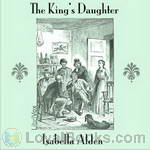 The King's Daughter
The King's Daughter
Dell Bronson has been reared in Boston by her refined uncle and aunt until, at age 18, she is called home by her father, a coarse tavern owner in Lewiston. As a daughter of the heavenly King, she strives to honor her heavenly Father by wooing her earthly father to Christ and away from rum. Set in the era of the temperance movement of the 1800’s. Authored by Isabella M. Alden under the pen name “Pansy.” Third in the Ester Ried series. | |
 Ester Ried
Ester Ried
Authored by Isabella M. Alden under the pen name “Pansy.” Ester Ried’s life is a dull monotony of toiling at her family’s boardinghouse. She’s overworked, jealous and cranky, a poor example of a Christian to her family and associates. She awakens to a new attitude and commitment due to an extended visit with her cousin. | |
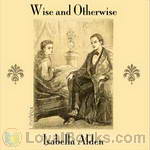 Wise and Otherwise
Wise and Otherwise
Immature Mr. Tresevant (from “The King’s Daughter”) comes to Newton with his spoiled wife to be the new pastor of the church attended by Dr. and Mrs. Douglass, Mr. and Mrs. Sayles, and Mr. and Mrs. Tyndall (from “Ester Ried” and “Julia Ried”), boarding with Jerome and Abbie Sayles. Authored by Isabella M. Alden under the pen name “Pansy.” Fourth in the Ester Ried series. | |
 Julia Ried
Julia Ried
Authored by Isabella M. Alden under the pen name “Pansy.” Sequel to “Ester Ried.” Julia Ried must take a job as a bookkeeper in a factory to earn a living. The mistress of her boardinghouse influences her in a negative way, drawing her into a life and attitude displeasing to God. Will her family and friends be able to convince her stand up for what’s right? | |
 Four Girls at Chautauqua
Four Girls at Chautauqua
Authored by Isabella M. Alden under the pen name “Pansy.” First in the Chautauqua Girls series. Four friends – spoiled, quirky Ruth; fun-loving and mischievous Eurie; poor, independent and brainy Marion; and meek, approval-seeking Flossy – attend Chautauqua on a lark, and their lives are changed forever. (Chautauqua is an adult education movement in the United States, highly popular in the late 19th and early 20th centuries. The Chautauqua brought entertainment and culture for the whole community, with speakers, teachers, musicians, entertainers, preachers and specialists of the day.) | |
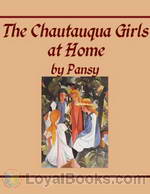 The Chautauqua Girls at Home
The Chautauqua Girls at Home
Sequel to Four Girls at Chautauqua. Ruth, Flossy, Eurie, and Ruth return home as new Christians, eager to begin working. Their new faith clashes with their old lives, which they must overcome, as well as the prejudices of friends and acquaintances. | |
 Ester Ried's Namesake
Ester Ried's Namesake
Ester Ried Randall tries to live up to her parents’ expectations and the name she’s been given, but her religion is a chore. Will she learn the lesson of faith that Ester did? Fifth and final book in the Ester Ried series. Authored by Isabella M. Alden under the pen name “Pansy.” | |
 Judge Burnham's Daughters
Judge Burnham's Daughters
Fifth in the Chautauqua Girls series. Ruth Erskine Burnham has helped raise her husband’s two daughters, but all have rejected her faith and values. The constant pressure to compromise has weakened her walk and made her life miserable. Her one comfort is her somewhat sickly 5 year old son. Will she return to the strong faith of her young womanhood, and will her family finally follow? | |